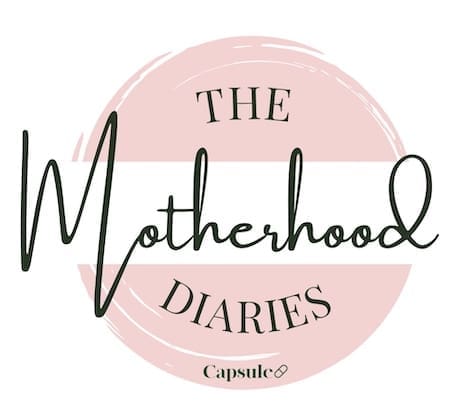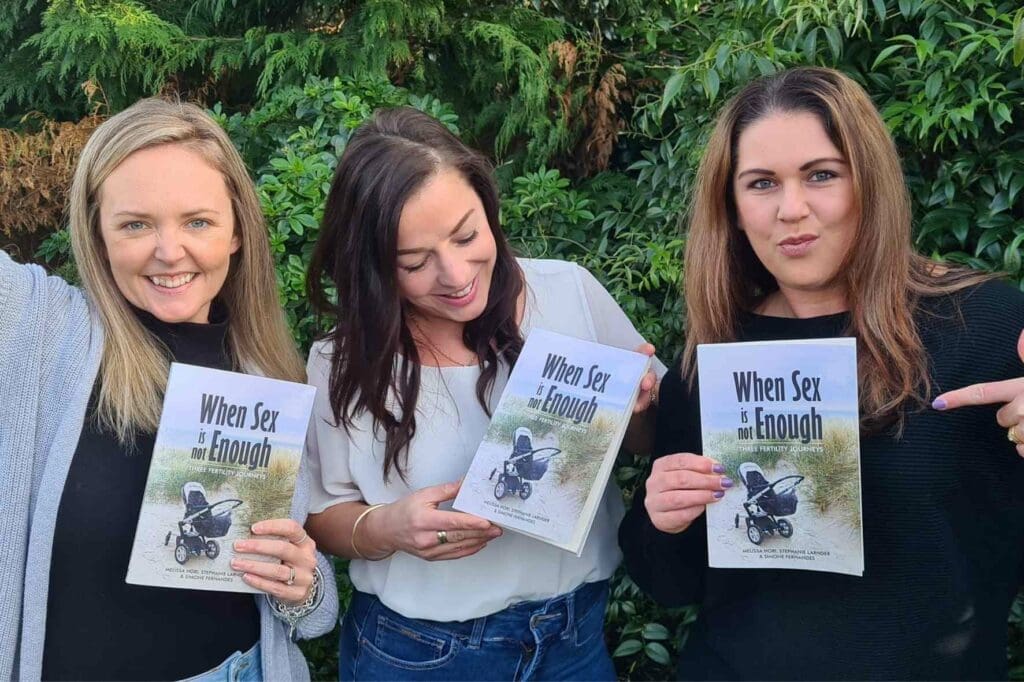

Welcome to our new series, The Motherhood Diaries – a safe space for you to share your experiences, advice, hopes and heartbreaks. We’ll be hearing from industry experts giving practical advice alongside Capsule readers (You!) sharing your firsthand experiences. We’re looking at everything from fertility, trying to conceive, pregnancy, the fourth trimester, newborns, toddlers, children’s mental health and teenagers, fertility issues and everything in between!

If you have a topic you’d like to discuss, share your thoughts, experience or advice about, drop a line to [email protected] with ‘Love’ in the subject line. All stories that are published will win three BOOST LAB serums following a Skin Advisor’s bespoke recommendation, worth $104.85.
A new book, When Sex Is Not Enough, tells the story of three Kiwi women who each experienced different fertility issues and it’s warm, funny, helpful and kind. Capsule speaks to two of the authors about how to support someone experiencing infertility, how to set out boundaries and why the words ‘at least’ need to be banished.
Through working together and mutual friends, Melissa Hori, Stephanie Larnder and Simone Fernandes all became sisters in arms during their fertility journeys; journeys that covered IVF, a hysterectomy, cancer, surrogacy and male infertility. That shared community was a crucial part of their experience, the women say, because it gave them a safe space to vent during the all-consuming experience of trying to have a baby.
“When our struggle started, there wasn’t anything that I could connect with,” Melissa says. “It was either ‘get to Fertility Associates and get the science’ – which I love, I was a science teacher – or it was ‘mummy blogs’, which have their place, don’t get me wrong. But I wanted something that wasn’t just [a rant], like blogs can be; I wanted something a bit more thoughtful and put together, like a book. And so I wanted that for other people, as well.”
“There was a gap in not only ‘how am I handling it in my own journey’, but ‘how do I make it easier for people around me?’” adds Steph. “There were times when I felt like a ticking time bomb, because things were so painful and so hard. I knew there was guidance we could give others about how to treat people going through infertility, just as much as we could give support to the actual people going through it as well.”


The result is When Sex Is Not Enough, which details the three women’s account through their fertility journey and the impact on their marriage, friendships and selves. It’s a wonderful book which feels like the kind of real talk you have on the second hour of your girls’ catch-up and it’s filled with first-person perspectives on how it feels to navigate fertility issues in a world – and a time of life – when everything points to baby.
Advice for People Going Through Fertility Issues
1. You Don’t Have To Go To Baby Showers
In one of Melissa’s chapters, she writes about how distressing baby showers can be when you’re experiencing infertility but you’re also very happy for your pregnant friend. After crying on the phone to her sister, after attending yet another one, her sister tells her simply: Just don’t go.
“You don’t owe anything!” Melissa says. “That was my realisation: why am I going? Because there’s a social obligation that she’s having a party, so I need to go. Huh?? And then the second part for me was then communicating to my friends what I was feeling.”
Melissa sent a simple, honest text message along the lines of ‘Just letting you know, baby showers are really hard for me. First birthdays are great, love them, please invite me. But baby showers are a no for me.’ She says the universal response from her friends was: Thank you!
“Because they don’t know what to do: they’re wondering, ‘Do we invite her? Do we not?’ It’s so awkward for them, so they loved getting the instructions about the boundaries I was setting.”
2. Be Honest With Your Friends & Family
It used to be that fertility/infertility fell under the ‘private women’s business’ where you never had to share your hope or your pain, because it was a bit messy. Well, what does that actually achieve? It means you suffer in silence and then eventually end up losing your shit after one too many thoughtless comments… and that benefits nobody.
Steph says that was her coping mechanism for too long. “I tended to play the peacemaker: bottle it up, and then one day, just burst completely and become a gremlin,” she laughs. “So I learned the hard way – I had too many outbursts. But having these skills – and getting the learnings from these girls – I was able to apply those and put those boundaries in place.”
Melissa says it was in a group chat with her school pals, organising a catch-up, when the conversation went from ‘are we bringing the kids’ into a deep-dive into breast-feeding and sleep schedules. Fine if you’re in a mums group, but like nails down a chalkboard when you’re struggling with infertility.
Again, it came down to setting a boundary. “I said to them, ‘If you’re going to talk about your kids in that kind of detail, please just do it in a private conversation,’” she says. “And it was like I gave them permission: ‘Talk about it behind my back! Don’t worry about leaving me out!’ And we never had to have that conversation again. It’s easier for everyone if there are clear boundaries.”
3. Acknowledge How Hard It Can Be For Your Partner As Well
In the book, each of the women’s partners write their own piece about their own experience during the journey to try and have a baby. “It was revealing and a bit ‘whoa’ to write – and read it – at times, but then we would step back and think, ‘Well, why have we done this in the first place?’ and it’s to help others,” Steph says.
“For my husband, he’s the one with the fertility factor,” Melissa says. “So we wanted to show that as well: ‘what is like for a man to have crap sperm? how does he feel about that?’ It’s important to talk about that side, as well as your inner partnership. Because whether it’s a man and a man, a woman and a woman, or a woman and a man… or even when it’s not a romantic relationship, but it’s the partnership between someone and their support person. How do you navigate that? It was important to show that it’s not just us it’s happening to – it’s the people around us.”
4. Find Your Community
Melissa and Steph were introduced by a mutual friend (Steph’s sister Raychil), who knew both of them individually and knew they were both experiencing infertility. Melissa was already a colleague of Simone, the book’s third author, but realised they had a shared experience at a work party when they both had a similar deer-in-headlights response to someone asking them if they had kids.
The three become fast friends because each of them understood what it was like to be struggling to conceive. “Empathy is one thing, but unless you’ve actually gone through it, in some cases, you don’t understand what it’s like,” Steph says. “Having this support group was so crucial because you could be ugly raw.”
For instance, they formed their own group chat. “Something would happen in your day and you were furious, or sad, or you just needed to be unfiltered, and you could with these two,” she says. “You could feel 100% loved, regardless of how shitty you were that day.”
“All three of us have experienced many of life’s little challenges, but fertility is next level,” Melissa says. “It is all-encompassing; you can’t get away from it. Particularly as a women – it’s how you’re labelled, everything relates to motherhood. So it was really necessary to have someone who got that level of it.”
What NOT To Say To Someone Who Is Experiencing Infertility
1. ‘At Least You Have Your….’
“The phrase ‘at least’ is awful,” Steph says. “This isn’t a great analogy but you wouldn’t say to someone who has mobility issues with their legs, ‘Oh, well, at least you’ve got arms.’ So why would you say to somebody who’s struggling to have a baby, ‘at least you’ve got a husband,’ or ‘at least you’ve got a house to live in.’”
2. ‘Just Relax!’
“’Don’t stress,’ ‘Just relax’, or ‘I know someone who had IVF and this is what they did…’” Melissa lists. “I get that this person is trying to make a connection, and as humans that’s what we always want to do, but it’s not helpful. Each story is so personal, and sometimes I just feel like: ‘Can you just let me sit in this? Because you telling me that story doesn’t fix my uterus, or my husband’s sperm.’”
What To Say To Someone Who Is Experiencing Infertility
“I’m Sorry, That Really Sucks.”
“Just an acknowledgment that this is hard and you get that,” Steph says. “And sometimes, it’s not saying anything at all. It’s turning up, making a cup of tea, putting an arm around me and watching shit TV with no conversation. Because what I know is you’ve heard that I’m not in the right headspace, you’ve turned up and you’re allowing me to say nothing while you support me physically.”
The #1 Piece of Advice
“Get a fur baby,” Melissa says. “They don’t try and fix you; they sit there, they cuddle, they know when you’re hurting and as people who wanted to be parents, that was our way of being a parent. I mean, our dogs are ridiculous – they’re living like kings – but it meant we could be Mums to them.”
And Finally… Please Stop Asking People If They Have Children/Why Don’t They?
“At the beginning, I’d laugh it off,” Melissa says. “Then I got quite blunt: ‘We can’t have children.’ Which is very confronting. But I just wanted people to stop and go, ‘Oh, I’ve just asked a question I shouldn’t have asked.’”
“For me, it I froze every time,” Steph says. “I had a script in my head but every time, my heart would just sink and I would freeze. And then I would be SO awkward, and then walk away thinking, ‘Great, now I can’t have a kid AND I’m awkward.’”
“And I’ve gone, ‘I can’t have a kid AND I’m a bitch,’” Melissa jokes.
Melissa and Lewis were able to have a baby girl via IVF, whereas Steph and her husband Matt welcomed their baby boy by surrogate. In the book, they talk about having the survivor’s guilt of being on the other side of infertility. “Where do I sit now? I’m no longer ‘the infertility person’… but yet, I still am,” Melissa says.
“We are on the other side but that doesn’t take away from the fact that we went through it,” Steph says. “There are days when I look at a pregnant woman and I go, ‘Man, I would love to be that.’ And then on the flip side, there’s that feeling of ‘Well, I wanted a child and now I have one, so I can never complain.’ What it’s done is made us very aware of what we say and how we say it, and we have a wider perspective – we just want to make sure that other people don’t experience what we did.”
When Sex Is Not Enough: Three Fertility Journeys by Melissa Hori, Stephanie Larnder and Simone Fernandes is available to order today here

